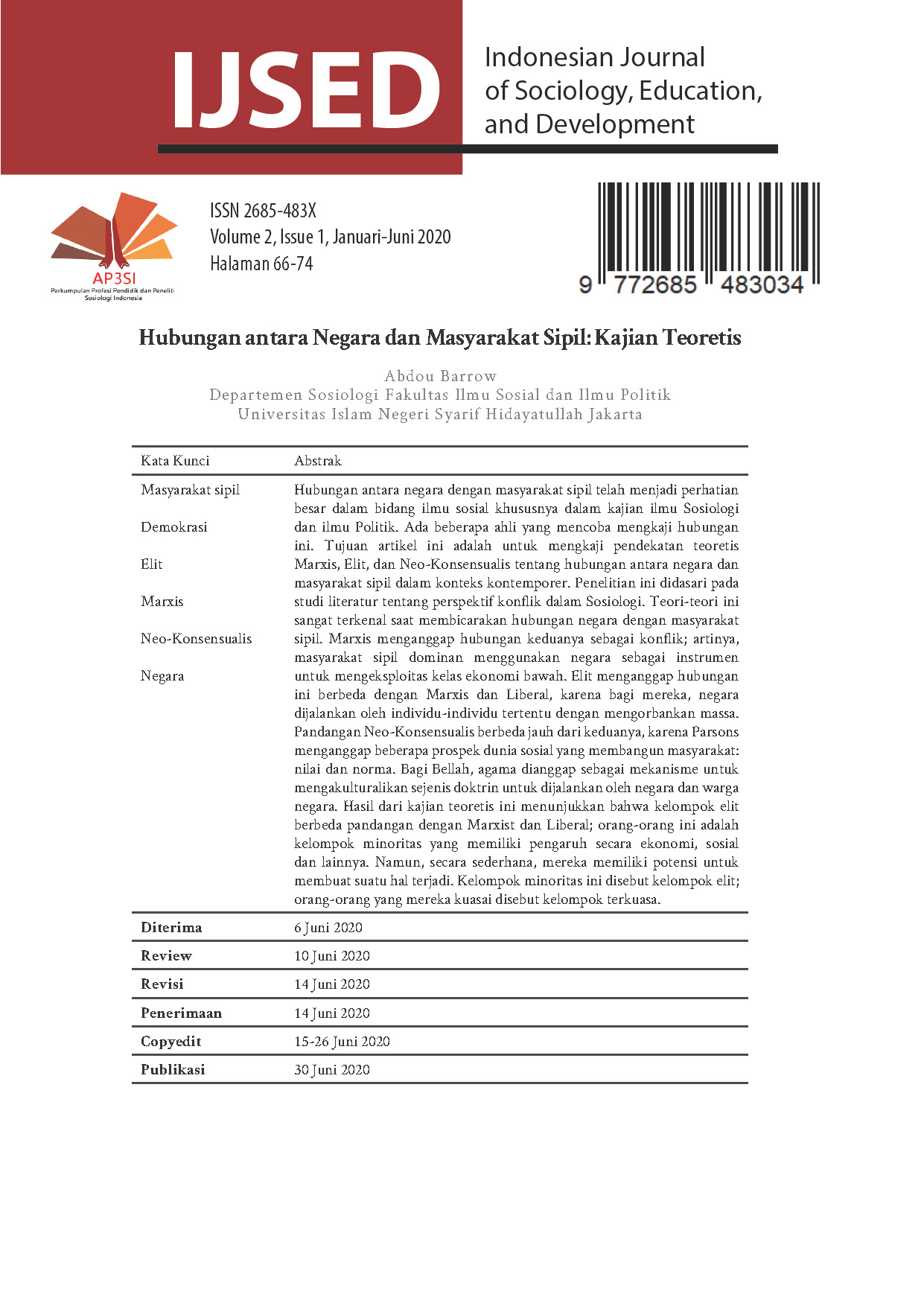Relationship between State and Civil Society: Theoretical Review
##plugins.themes.academic_pro.article.main##
Relationship between state and civil society has been of great interest in the field of social sciences especially in the field of sociology and political science. There have been several theorist that tries to look into this relationship. The aim of this paper is to review the theoretical approaches of Marxist, Elites, and Neo-Consensualist on the relations between state and civil society in nowadays societies. Research are based on literature studies, on conflict perspectives in sociology. These theories are very prominent when talking about state-civil society relationship in sociology. Marxist looks the relationship between the two as conflictual, meaning dominant civil society use the state as an instrument in exploiting the weak economic class. Elites argue the relationship differently from that of Marxist and liberals, as for them, state is run by few individuals at the expense of the mass. In the eye of Neo-Consensualist is entirely a different story, as that of Parson view certain prospectin the social world of constituting the society that is; norms, and values. As for Bellah he sought religion as a mechanism in the spirit of acculturating a kind of doctrine in a sense that, state and citizens go bye. Result for this theoretical views is elites show the relationship different from the Marxist and liberals, as for them the state is run by few individuals at the expense of the mass. This people are a minority group that has influence through economically, socially and the like but in short they have potentials in making things happen. This minority group the called them the elite as the mas they called the ruled.
##plugins.themes.academic_pro.article.details##

Artikel ini berlisensi Creative Commons Attribution 4.0 International License.
- Althusser, L., and E. Balibar. (1975) Reading Capital. Translated by B. Brewster. London: New Left Books.
- Ansori, M. (2009). Consumerism and the emergence of a new middle class in globalizing Indonesia. A Graduate Student Journal of Southeast Asian Studies 9 (1):87-97.
- Bellah, Robert N. 2018. “Civil Religion in America Author ( s ): Robert N . Bellah Source : Daedalus , Vol . 96 , No . 1 , Religion in America ( Winter , 1967 ),Pp . 1-21 Published by : The MIT Press on Behalf of American Academy of Arts & Sciences Stable URL: //https://Www.Jstor.Org/Stable/20027022 Civil Religion inAmerica.”
- Bellah, R. N., & Tipton, S. M. (Eds.). (2006). The Robert Bellah Reader. USA: Duke University Press.
- Booth, J. A., & Richard, P. B. (1998). Civil society, political capital, and democratization in Central America. The Journal of Politics, 60(3), 780-800.
- Chambers, S., & Kopstein, J. (2006). Civil society and the state. The Oxford handbook of political theory, Eds: Dryzek, J.S, Honig, B and Phillips, A pp. 363-381 , New York: Oxford University Press Inc
- Dash, S. P. (2001). The State, Civil Society and Democracy: A Note. The Indian Journal of Political Science, Vol 62 No 2, pp. 241-252.
- Frosini, Fabio (2017) Cosmopolitanism, Nationalism and Hegemony: Antonio Gramsci’s Prison Notebooks and the European Crisis, International Critical Thought, 7:2, 190-204, DOI: 10.1080/21598282.2017.1316679
- Gane, N. (2005). Max Weber as Social Theorist: ‘Class, Status, Party.’ European Journal of Social Theory, 8(2), 211–226. https://doi.org/10.1177/1368431005051764
- Geoghegan, Vincent (2017) Althusser, Machiavelli and the “Theoretical Utopia”, International Critical Thought, 7:2, 219-232, DOI: 10.1080/21598282.2017.1316678
- Khadiagala, G. M., & Lyons, T. (Eds.). (2001). African foreign policies: Power and process. USA: Lynne Rienner Publishers.
- Kymlicka, W (2002). Contemporary Political Philosophy: An Introduction, New York: Oxford University Press Inc
- López, M. (2013). Elite theory. Sociopedia. isa, 1-12. Retrieved 02 Feb, 2020 from: https://d1wqtxts1xzle7.cloudfront.net/53215484/elitetheory.pdf?1495347580=&response-content
- Michels, R. (1984). Partai politik: kecenderungan oligarkis dalam birokrasi, Jakarta: Rajawali Press
- Morató, AR (2012). The analysis of cultural policy in a sociological perspective. Introductory keys to the study of the Spanish case. RIPS: Journal of Political and Sociological Research , 11 (3).pp. 102-119
- Putnam, R. D. (1995). Tuning in, tuning out: the strange disappearance of social capital in America. PS: Political Science & Politics, 28(4), 664+.
- Obo, U. B., & Coker, M. A. (2014). The Marxist theory of the state: An introductory guide. Mediterranean Journal of Social Sciences, 5(4), pp. 527-533

